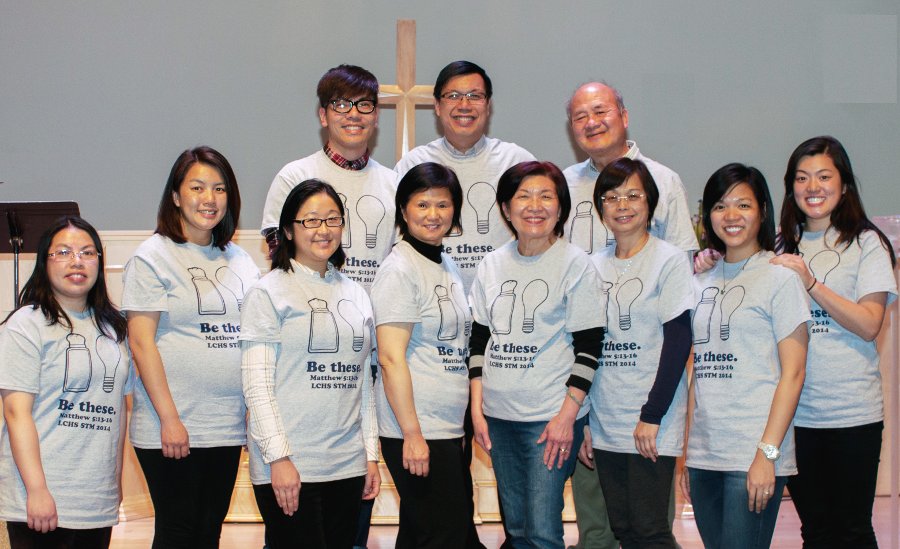
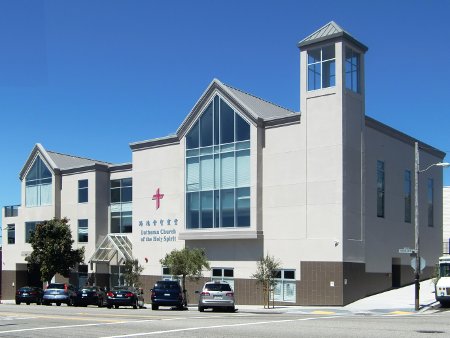

Faith from the Heart
Rev, Shiu Ming Lau, Senior Pastor
“No, a man is a Jew if he is one inwardly, and circumcision is circumcision of the heart, by the Spirit, not by the written code. Such a man’s praise is not from men, but from God.” Rom 2:29

The character, Superman, is a description of American’s heart. I have watched Superman since I was young, and there have been different people starred in it. Television has also made this into a TV series. During one business trip, I had a chance to watch this again in the hotel. In one of the scenes, this superman reporter Clark Kent, said to the girl friend who he likes, Lois, “We’ll just be friends.” The director purposely focused the camera on his hand, because he did a lie sign with his hand. Today many Christians have said to our Lord, “Lord, I will love you with all my heart,” and then do the same sign behind the back. Paul said, “A man is a Jew if he is one inwardly, and circumcision is circumcision of the heart, by the Spirit, not by the written code. Such a man’s praise is not from men, but from God.” Christians are being called the Israelites/Jews of the new covenant/grace. When the Holy Spirit enlightened us so that we received the great gift from the Lord, we have to show our faith from our hearts (or working from within; working from the heart). Similarly, we have to keep our hearts firmly of what we believed.
In the Old Testament, God frequently used prophets to reproach His people’s hypocrisy. One such well known verse was recorded in Isaiah, “These people come near to me with their mouth and honor me with their lips, but their hearts are far from me. Their worship of me is made up only of rules taught by men.” (Isa 29:13) In the New Testament Gospel books, Jesus used similar tone to reproach the religious leaders of that time, the Pharisees. One of those, the famous “seven woes” was recorded in the Gospel of Matthew, chapter 23. Pay particular attention to Matthew 23: 25 – 28, it used “inside” four times. Truly our Lord, with concern, is always asking us, “So how are you inside?”
We need to place our faith in the good soil of our hearts so it can bear much fruits. In the Middle East, wheat is commonly the seed being sown. Jesus once said, “Unless a kernel of wheat falls to the ground and dies, it remains only a single seed. But if it dies, it produces many seeds.” (John 12:24) In many ways, the life cycle of a kernel of wheat is connected to the truth that Jesus was proclaiming in a subtle manner. A kernel of wheat’s life, from the time being sown at the end of autumn to the time it germinate and grow, is immediately faced with the test and persecution of winter, and is covered and buried by the snow. Then when spring returns, the buried kernel once again grow from the ground and produce many seeds. The wheat is a perfect analogy of Jesus Christ, whose redeeming work has also brought us the Kingdom of Heaven.
Jesus has also use the parable of the sower to encourage His disciples. (Matthew 13:1-9) The kernel falls to the ground reminds us Christians the type of soil we used to strengthen our faith. There are four kinds of ending our Lord mentioned: “The first kind fell along the path, the second kind fell on rocky places, the third kind fell among thorns and the fourth kind fell on good soil.” The bible said, “The first kind that fell along the path is when anyone hears the message about the kingdom and does not understand it, the evil one comes and snatches away what was sown in his heart. The second kind that fell on the rocky places is one who hears the word and at once receives it with joy. But since he has no root, he lasts only a short time. When trouble or persecution comes because of the word, he quickly falls away. The third kind that fell among thorns is one who hears the word, but the worries of this life and the deceitfulness of wealth choke it, making it unfruitful. Finally the fourth kind that fell on good soil is the man who hears the word and understands it. He produces a crop, yielding a hundred, sixty or thirty times what was sown.”
Actually these scenarios can happen in the weekly worship services, or in the daily devotions. Whenever you read this passage, what is your response? Do you feel sorry to the ending of the first, regrets to the premature death of the second, pity to the third, and admiration to the fourth? In fact, our spiritual hearts struggles with this constantly in a never ending cycle. We cannot look at this with the attitude of a spectator, because sometimes this parable does clearly point out our wrongs.
The bible says, our hearts are wellsprings of life. Therefore we need to rely on the Holy Spirit’s enlightened word (God’s Word) to examine ourselves, and to pursue faith with humility. You need to continually ask yourself daily what spiritual lesson you can learn. One way you can consider is to use role play to meditate on the bible passage. For example, identify yourself in the four kinds of ending in the Parable of the Sower and then examine yourself. Ask yourself, “Which kind of people do I belong to at the present time?” “What is the reason?” Finally, come up with a practical action plan of change for yourself.
We need to give an all out effort and to sustain to the end for the truth that we’ve received. I pray that our Lord will remind us to become a genuine spiritual Jew, and to treat all believers with spirit and truth.

Congregational Healing and Reconciliation
Rev. Christopher Ng, Associate Pastor
Margo Maris uses an illustration of stained-glass windows to help understand the hurts and the healing processes for congregations. She reflects on how many stain-glass windows were removed from European cathedrals and hidden in safe places during World War II. Once the war was over, it was declared safe to bring the stained-glass windows out again as the cathedrals were rebuilt. Like the fragile glass, "we find the initial breakage in a person wounded by hurts. It is only when a person is able to pick up those pieces again and begin to place them side by side in some recognizable form that there will be hope of restoration and wholeness - holiness" (Hopkins, 5).
Restoration is a painful process because the person was betrayed in trust by someone who may be seen as more professional, relational, popular, spiritual, and moral in comparison. Hence, the victim (or congregation) may easily be tempted to minimize himself (or themselves) with "DIM thinking" - Denial of the event, Ignorance of how to deal with the situation, and Minimization of the issue (Johnston, 45). The victim could easily be the one being blamed for making a big stir within the congregation. Hence the easiest way of dealing with conflict is to silently keep it in the past. However, that is also the most unhealthy way of restoration.
A question which people may ask is, "Can there be total restoration and healing?" That may not be possible during a lifetime. In a sense, we cannot go back to start new again, but the idea is that we can find new endings, especially as followers of Christ. For the victim and bystanders, God encourages faith and gives hope of resurrecting from the past towards a new life.
Many changes will need to happen for people to heal from a case of hurts. In the congregation setting, a plan is usually implemented, a cooperation between lay leaders and called ministers or counselors. Jan Winebrenner outlines six characteristics of churches which have survived hurts and progressed to effective ministry: 1) the sin was not covered up, 2) the congregation was given the opportunity to express its grief honestly, 3) counsel was provided for church members, 4) plurality of leadership was in place, 5) recruitment of a new leader committed to strong Biblical teaching followed the fall of the previous leader, 6) a plan of accountability was implemented (Winebrenner, 186).
The focus here is primarily people and that recovery is a team effort. First, one of the dangers of covering up the sin is that the victims may be buried too. "We do not ignore the church's ultimate goal of restoring the victim to fellowship" (Johnston, 219). This is a necessary component in the victim's and the congregation's healing process. Second, to release anger is a component of grief and healing. The congregation may need individual or small group therapy to help them express their feelings. Winebrenner notes that in recovering churches, healing "wasn't administered from the pulpit on Sunday mornings... It happened in small groups where the members of the body ministered to one another with sympathy, understanding, and openness" (Winebrenner, 180). Third, leaders may have a challenging task to minister from a damaged office, however they still have a role in sharing God's forgiveness and grace to a hurt congregation. "Plans to remove guilt involve unique teaching because in all areas of abuse the victim has far too much self-blame and false guilt. There needs to be an overabundance of grace spoken and modeled" (Johnston, 225). Fourth, power is also abused in misconduct, and a wounded congregation also has to maintain a balance during the healing process. Often a wounded congregation may react negatively in mistrust or in false relief by giving all leadership to someone else (Hopkins, 157). Fifth, the following leadership has to be carefully selected. Winebrenner notes that some congregations are quick to heal such that they fall into the cycle of selecting a dynamic, new leader based on personality over sound Biblical teaching (Winebrenner, 189). Sixth, accountability within the church falls upon the pastor and the congregation. Often the focus may be on one person's actions and time; however, the congregation, itself, also has to reflect on its own health and expectations.
Another subject which the wounded congregation have to address carefully is forgiveness. This may be a "given" especially in a Christian perspective. However, a simplistic view or definition of forgiveness can undermine the healing process. Lynn Heitritter notes that forgiveness is crucial, not just a feeling, but an act of one's will to forgive and say, "I forgive you" which in itself may be a very difficult task (Heitritter, 203). From a non-Christian perspective, Ellen Bass states that the victim's forgiveness towards the abuser or those who failed to protect the victim has no direct benefit in the victim's healing process; furthermore, if forgiveness was the goal of a victim's healing, it may actually undercut the process (Bass, 149). Though Bass holds a non-Christian perspective, she raises important thoughts as to how a congregation deals with forgiveness. What a congregation has to consider first is "What is the definition of forgiveness?"
Here the congregation needs to remember that forgiveness doesn't equal forgetfulness. "Hiding in the past always involves denial: denial of the past is always a denial of God. To forget your personal history is tantamount to trying to forget yourself and the journey that God has called you to live" (Allender, 15, original emphases). As mentioned before, to release anger is a component of grief and healing. When one suppresses anger, there is no opportunity to proceed in healing or forgiveness. The desire to keep one's anger and even cause retribution actually drives the hurt person(s) further away from God.
The reminder here is that every person needs daily contrition and forgiveness, even the abused. "To refuse to let God develop an attitude of repentance for my own sins and to hoard the hate and anger against another is unhealthy for it keeps us victims and does not allow us to become victors or even survivors" (Johnston, 240). The goal here is to let God do the work of repentance within us, so that we can express and move through anger and away from reactions which make us unloving. Repentance moves us towards wholeness and holiness. Once we experience our own forgiveness from God, then can we consider our forgiveness of others.
The area of our forgiveness of others is a bit more complicated. In the process of healing, we might be tempted to rush or nudge people to extend forgiveness when they are not ready yet. Or forgiveness may seem superficial especially when the abuser is not repentant. Here, the congregation needs to understand "completed forgiveness." Heitritter describes it as extended from the heart of the victim and received in repentance by the perpetrator for the fullness of the transaction that God intends forgiveness to accomplish (Heitritter, 208). The process of "completed forgiveness" is ultimately God-driven and may take much longer than expected, years instead of months. This is important to understand when some consider "saying sorry" is sufficient to begin restoring an offender. The distinction here is clarified by a counselor - "Restored as people, and restored to the body, Not restored to one particular position or group -- this is the church's primary goal at the time... grace is our hope, but grace does not remove consequences. Grace puts shattered pieces together but does not prevent the crash that shatters" (Johnston, 246).
Most congregations may not be fully prepared to handle a case of conflict and hurt, much less the healing of a congregation. However, in the event of such tragedy, God doesn't want us just to deal with it but also overcome and grow from it. Preemptively, a pastor and his congregation can take steps to discuss these issues, explore resources for prevention, counseling, and therapy, and arrange action plans, like Winebrenner's mentioned above. Yet, after such tragedy, there is also a time to explore growth.
Hopkins, in her book, provides a comparison chart of Open and Closed Congregation systems. Here, pastors and lay leaders can use this tool to assess the health of a congregation, either preemptively or in the healing process. Enclosed is a brief sample:
| (Hopkins, 203-205) | Open | Closed |
| Clergy | Young assistants move on after a reasonable time. Leaving without guilt. | Burning out. Acting precipitously. |
| Lay Leaders | Power spread evenly throughout the lay leadership. | One or two people controlling events. Some people behaving destructively. |
| Boundaries | Healthy. No secrets. Leaders and congregants needs met in appropriate ways. | Too loose. Leaders violating boundaries with congregants, having feelings of entitlement. |
The healing of a congregation is a team effort. The team may consist of pastors, lay leaders, counselors, mental health professionals, crisis care professionals, etc. The team may also have a mixture of men and women. And ultimately, the team will have God there, too. This is all essential in rebuilding the community of believers. The path of healing requires the fruits of the Holy Spirit to be fostered in each individual within the community. The story of the community may hopefully be of strength to itself and to others.
Bibliography
Allender, D. "The Wounded Heart." Colorado Springs: Navpress, 1990.
Bass, E. and Davis L. "The Courage to Heal: A Guide for Women Survivors of Child Sexual Abuse" New York: Harper and Row. 1988
Heitritter, L. "Helping Victims of Sexual Abuse." Minneapolis, MN.: Bethany House, 1989.
Hopkins, N. and Laaser, M. "Restoring the Soul of a Church" Collegeville, MI.: The Alban Institute in association with the Interfaith Sexual Trauma Institute, 1995
Johnston, A. "Wounded Churches: Causes and Curative Suggestions for Congregations and Afterpastors." 1999. Doctoral Dissertation
Winebrenner, J. "When a Leader Falls: What Happens to Everyone Else?" Minneapolis, MN.: Bethany House, 1993.

Is It Necessary To Be Baptized — Why Baptize?
Rev, Shiu Ming Lau, Senior Pastor
Due to the prevalence of altar calls in the evangelistic/gospel events to express the desire to believe Jesus, many church members may be hesitant of when they were truly saved. In addition, we may ask, “Is it the result of my decision that fulfill this salvation or is it God’s grace?” Let’s reflect again on the meaning of baptism in this month’s issue.
Lutheran’s teaching: baptism is a sacrament, a means of grace. What does this mean? Means of grace refers to a way that God has instituted to forgive our sins. The Lutheran theology is not a doctrinal theology, but rather a biblical theology. In another word, our belief and teachings, or confession must use the bible as the foundation. The following bible verses talk about baptism:
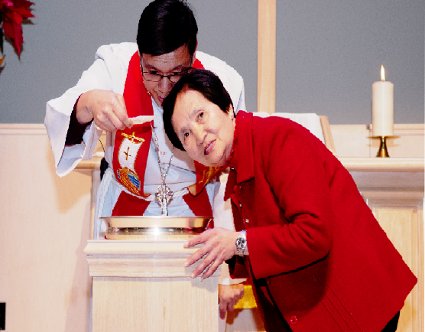
Firstly let’s look at Matthew 3:5, 6 — This passage talks about baptism as the baptism of repentance, an action to make known of repentance.
“People went out to him from Jerusalem and all Judea and the whole region of the Jordan. Confessing their sins, they were baptized by him in the Jordan River.” The meaning of baptism clearly indicated repentance. They want to make known of their remorse, so they went out to get baptized. If repentance is the beginning of our faith, then baptism is an importance start of faith. In the time of Jesus, there are no evangelistic gatherings; they also do not raise their hands but used baptism as a sign to believe.
Secondly, look at Matthew 28:1–20. This talks about Jesus’ command and instruction on baptism.
Then Jesus came to them and said, “All authority in heaven and on earth has been given to me. Therefore go and make disciples of all nations, baptizing them in the name of the Father and of the Son and of the Holy Spirit, and teaching them to obey everything I have commanded you. And surely I am with you always, to the very end of the age.”
Here the Great Commission of Jesus included baptism. In another word, it was Jesus who instituted baptism and used baptism to call and identify disciples. The privilege of baptism in the Great Commission included all nation, man and woman, young and old. Baptism is public and thus the church treats baptism as sacrament. When we are baptized in the name of the Father, the Son and the Holy Spirit, that means we are received into the communion of the triune God. Therefore baptism tells us we belong to God. Not only that we “believe” that we belong to Him, it is baptism that gives us this certainty. Unless we publicly deny our Lord, our occasional sins will not take away the assurance of the salvation. The remorse of sin in our hearts is the clear testimony of our faith.
Thirdly, in John 3:3 and 3:5. Baptism calls us to born again.
In reply Jesus declared, “I tell you the truth, no one can see the kingdom of God unless he is born again.” “How can a man be born when he is old?” Nicodemus asked. “Surely he cannot enter a second time into his mother’s womb to be born!” Jesus answered, “I tell you the truth, no one can enter the kingdom of God unless he is born of water and the Spirit.”
The original meaning of “born again” is coming from above. This does not mean the sinful body is born again from the flesh, rather it begins spiritually and the gift from above. The water and the Holy Spirit do not symbolize, but it is the actual water and the guidance of the Holy Spirit. We have a new beginning in the Lord, and thus Paul used 2 Corinthians 5:17 and Titus 3:15 to convey the result of this renewal.
Fourthly, in Acts 2:37 – 39 and 22:16. Baptism calls the believer to take the first step and be baptized for the forgiveness of sins.
When the people heard this, they were cut to the heart and said to Peter and the other apostles, “Brothers, what shall we do?” Peter replied, “Repent and be baptized, every one of you, in the name of Jesus Christ for the forgiveness of sins. And you will receive the gift of the Holy Spirit. The promise is for you and your children and for all who are far off – for all whom the Lord our God will call.” (Acts 2: 37 – 39)
Peter spoke to us about God’s promise, baptize for the forgiveness of sins. Forgiveness is God’s promise, and now this promise of forgiveness has carried out through baptism. Because of this, God has granted us the eternal salvation. (Mark 16:16) Furthermore, we are saved from death and Satan through baptism. This is precisely the meaning of Romans 6: 1 – 4.
Finally, there are still some people bring up the question, “Is baptism really necessary? Are there any exceptions? If exceptions can be established, then why still stress baptism?”
We all think: The thief next to Jesus on the cross is an exception, because Jesus said to him, “Tonight I will be with you in paradise.” In the same reasoning, the seeker who died in an accident, or the person who accepted Jesus but not able to get baptized before dying, these are the exceptions that we speak of. However, there is not one person or exception to make someone refuse baptism. In fact, the Lord’s disciples follow the Lord’s footsteps and do what He commands. Therefore, no one can refuse the Lord’s command – to receive the gift of forgiveness through baptism. Baptism is an act of faith, a means of grace to the new believer. It is not a crowning ceremony for the mature Christians. In another word, we do not baptize after we did good to show that we are Christians, but to know that we are unworthy and unclean, to believe that the Lord will cleanse our sins through this means of grace. Therefore, baptism is not self-centered, but God-centered. For He spoke, and it came to be; He commanded, and it stood firm.

The Uniqueness of the Lutheran Church
Rev, Shiu Ming Lau, Senior Pastor
Last issue I completed the first two characteristics, (1) Four solid basic doctrines and (2) Sacraments and the Word. This issue I will continue (3) to (6).
- 3. A church with Creeds and Confessions as the foundation
The Lutherans use the Bible as the foundation, at the same time the creeds are valued. Besides the Apostles’ Creed, the Nicene Creed and the Athanasian Creed, the other confessionals were drafted during the time of church reformation. Initially it was used to differentiate the Roman Catholics and the Christianity, it was later became the content and the foundation of Lutheranism (Luther’s Large and Small Catechism, the Book of Concord, Augsburg Confession, Apology (Defense) of the Augsburg Confession, and the three Creeds). The creeds cannot replace the bible; they can only be viewed as abbreviated versions of the bible. In order to satisfy the principle of “scripture only”, the creeds are to be discarded whenever they are differed from the Bible. - 4. Nurture and value the basic doctrines
Lutheran churches will emphasize on nurturing and the teaching of the basic doctrines of the new believers. There are six basic doctrines: The Ten Commandments, the Apostle’s Creed, the Holy Baptism, the Holy Communion, the Office of the Keys, and the Lord’s Prayer. Almost all the basic doctrines are being used in the worship liturgy. - 5. Value the meaning of union more than remembrance in Holy Communion
Although the Lutherans also claim to remember the Lord in Holy Communion, but the Lutherans value the union with Christ in Holy Communion, to partake in His body and blood together with the wine and the bread. Therefore, the Lutheran churches emphasize on the four means in Holy Communion. The bread and the wine are the visible elements while the body and the blood are the invisible elements. During the Communion, we remember our Lord, proclaim His death, look forward to His return, and renew our Lord’s covenant. In addition, our sins are forgiven and the hope of our spiritual lives being strengthened and preserved. - 6. Two righteous acts
The Lutheran churches differentiate 2 types of righteous acts. One is the civic righteousness, the proper obligation we have to the society and people. The other righteousness is one that only Jesus Christ can fulfill. He is God’s righteousness, to fulfill God’s demands to the world. Through this we can be reconciled with God, and to be called righteous. This is completely fulfilled by the Lord’s grace and work.

A Letter From Overseas
Peace to you from our Lord Jesus! We have been in Macau for over a month. I am writing to you today, which happens to be this year’s coldest day in Macau. Although it is cold and drizzling outside, when we think of you our hearts are filled with warmth.
Macau is a densely populated city. The total area of Macau is about one fourth of San Francisco, but the population is over 600,000 people. Tourism and gambling are the backbone of the economy in Macau. Many tourists are visitors from mainland China. It is often very crowded at the tourist attractions.
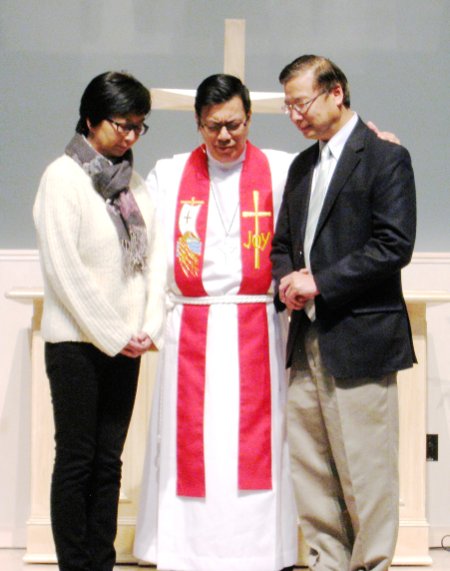
In terms of religion, over one half of the people worship ancestors and Buddha, while about one tenth of the people are Catholics and Christians. Therefore, there is a great need for spreading the Gospel here.
The place we serve is the Lutheran Concordia English Center. Through teaching English and Bible Study classes, we share the Gospel with the students. There is a big age gap among the students. Four or five year old children to fifty, sixty year old adults come to attend the classes. Other missionaries in the English Center are Caucasians who came from different parts of the United States. Even though they do not know Mandarin or Cantonese, they have a zealous heart for the Gospel. We have a very good working relationship with them. We always help each other and encourage one another. We enjoy our “for me—no more desire, for the Lord-- surrender all” spirit.
Another place we serve is the 希望之源 Orphanage. This orphanage adopted about eighty orphans. Their ages range from newborn to eighteen years old. The mission of the orphanage is to provide love, respect, and a safe home for the needy children, lead and teach them with Jesus Christ’s values and principles so that they are well prepared to face the future and to become responsible people in society.
Lastly, we want to thank brothers and sisters and the church for your support and prayer. We miss you very much. We pray that “the God of our Lord Jesus Christ, the Father of glory, may give you spiritual wisdom and revelation in your growing knowledge of him, --since the eyes of your heart have been enlightened—so that you may know what is the hope of his calling, what is the wealth of his glorious inheritance in the saints, and what is the incomparable greatness of his power toward us who believe, as displayed in the exercise of his immense strength.”
May the grace, peace and joy from our Lord Jesus Christ be with you always.
In Christ,
Peter and Agnes Ng

Our first 2014 LWML LIA/Yun Deen general meeting was held on Sunday, February 16, 2014 with 61 attendees. The 61 attendees included spouses who were very supportive and helped with clean up while their wives’ attended the general meeting. The theme was “The Kingdom of the Gospel.” The event began with lunch which was prepared with love by some members and held in the Parish Hall surrounded by a Chinese New Year ambiance. Winnie Lam and Eva Ho led praise time in the Sanctuary to prepare our hearts for the devotion. Mrs. Lau's devotion referenced Matthew 4:23-24 where Jesus preached the gospel in synagogues and healed those who were diseased or demon possessed. It encouraged us to follow His example in sharing the gospel and helping those around us. The event followed by a love gift presentation to Ashley Wong who plans to enter into long-term missions in Hong Kong and China. We also welcomed our Yun Deen ladies who joined our LIA society’s meeting for the first time. Eling Ng was unanimously transferred from being LWML LIA’s Vice President to the treasurer position. The LWML LIA society will have to elect a new President this June, therefore, we ask that you keep this in your prayers. The Secret Angel activity was the highlight of our event. The 42 ladies picked a small envelope containing a name in which she will be a secret angel for that person for the rest of 2014. A secret angel’s goal is to show love, send encouragement cards, and pray for the person without revealing our own identity. The secret angel’s identity will be revealed at our December 7th general meeting. Each of the ladies will present a gift to thank their secret angel. Some of the ladies do not know one another, therefore, there was a time where each person introduced themselves and shared their prayer request. The event ended with a group picture filled with wonderful smiles. I hope you all can come to our next meeting in June! May God's blessings be with all of you!
Barbara Louie, LIA President
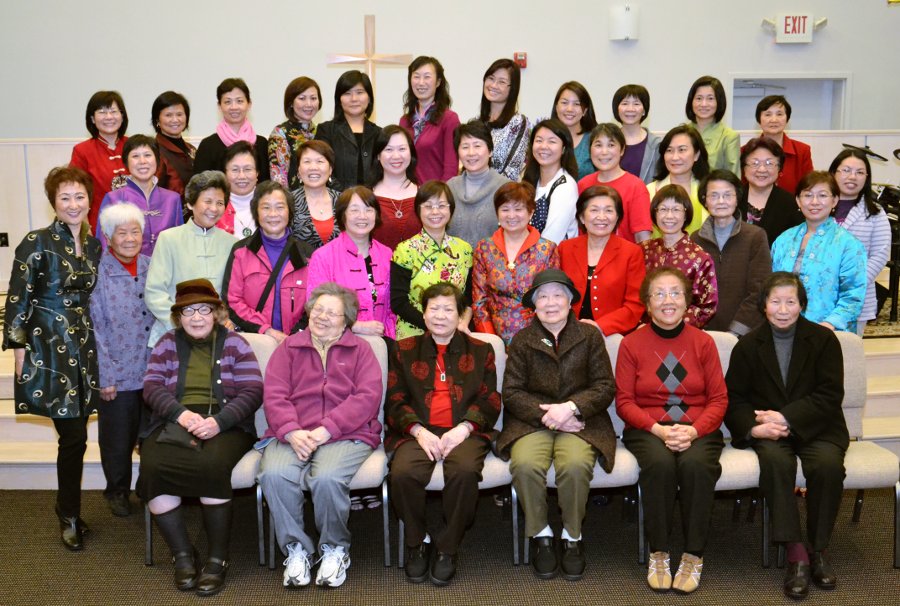

Sixth Annual Mission Conference

"You are the salt of the earth... the light of the world... let your light shine before others that they may see your good deeds and glorify your Father in heaven" (Matthew 5:13-16). One of the many verses in Scripture instructing us how to "live like Christ". "Live Like Christ", our theme for this year's 6th annual Mission Conference was held over a three day weekend on 2/21-2/23. The conference began on Friday night with Pastor Peter Kim's message on "Knowing Our God is the Foundation Behind Missions.” Around 80 people attended this conference and were challenged to reflect on Jonah's story to better understand "who God is" in the midst of the revelation of Israel's long redemptive history. By "knowing" and not just simply "believing" who God is, our mindset is transformed to become more missional simply because "God is in a business of pursuing sinners". In order for us to be "proper" ambassadors of Christ, we need to "know" who we are the ambassador for, namely Christ.
Pastor Kim continued to challenge us on Saturday morning in a workshop where he provided a topic message on ecclesiology, which is a study of church. Around 35 people were present as we continued to learn how church has everything to do with missions. Pastor Kim drew a clear connection between the local churches and their missionaries, this is to say that the "health of a local church is reflective of how successful a missionary is." And as soon as the local church neglects to be missional, our support for the missionary will naturally decline, which in turn causes our missionaries to suffer tremendously (specifically in areas of prayer and financial support).
As the conference wrapped up on Sunday, our church had the privilege to commission our very own missionary, DCE Ashley Wong, to China this coming March for an initial period of 18 months. This is of the most significance of the conference because we get to witness and actively participate in what we have learned.
We praise God for Pastor Peter Kim, who is a returning guest speaker from Berean Community Church based in Costa Mesa, California. May God continue to bless his ministries.
